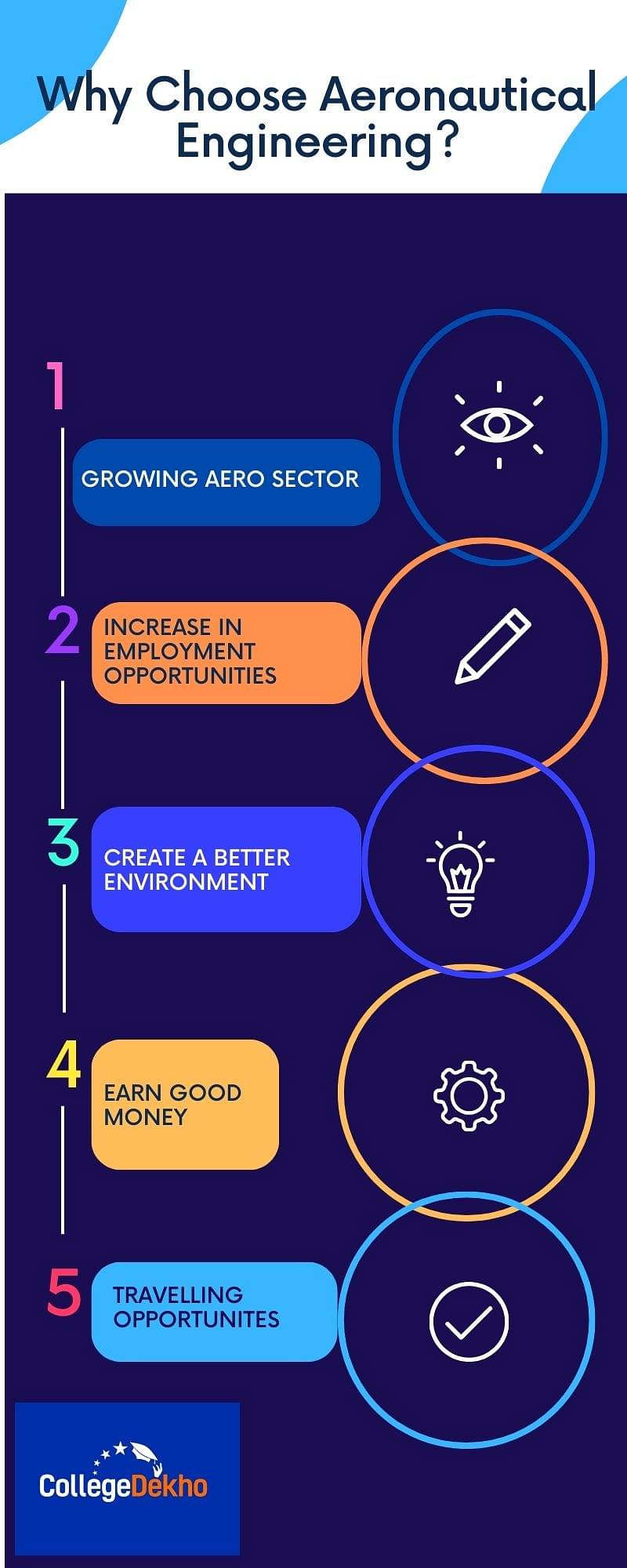Aeronautical Engineering
Aeronautical Engineering Course Overview
Aeronautical engineering is concerned with the design, manufacture, testing, and maintenance of flight-capable machines. These machines include all types of helicopters, aeroplanes, drones, and missiles. Aeronautical engineering is part of units of astronautical engineering, and aerospace engineering. The major distinction between these two kinds of aerospace engineering is that aeronautical engineers scrutinize strategies that function within the atmosphere of Earth and astronautical engineers are involved with objects that function outside the atmosphere, such as rockets, satellites, and shuttles.
Read More - Aeronautical Engineering vs Aerospace Engineering – Find out the Better Option
Candidates can pursue B Tech aeronautical engineering after finishing their Class 12th. Admission to this course is done majorly with entrance exams like AME CET, JEE Advanced, GATE, LPUNEST, etc. The aeronautical engineering syllabus includes core subjects like Aerodynamics, Thermodynamics, Aircraft Maintenance, Engineering Mechanics, etc. Aeronautical engineering courses are available online and offline as well. With rising demand for air travel and space exploration, the need for aeronautical engineers is projected to stay high, providing exciting opportunities for professional progression.
Some of the top aeronautical engineering colleges in India are MIT Manipal, Dayananda Sagar College of Engineering, Anna University, Sathyabama Institute of Science and Technology, Bannari Amman Institute of Technology, Erode, etc. The aeronautical engineering fees in India are around INR 80,000 to INR 14,50,000. Candidates after the conclusion of the course are offered Aeronautical Engineering Jobs from top companies such as Civil Aviation Department, Indian Air Force, etc. The average Aeronautical Engineering Salary in India ranges from INR 5,00,000 to INR 12,00,000 per annum.
Table of Contents
- Aeronautical Engineering Course Overview
- Aeronautical Engineering Course Highlights
- Why Choose Aeronautical Engineering?
- What is an Online Aeronautical Engineering Degree?
- What is the Difference Between Aeronautical Engineering and Aerospace Engineering?
- Types of Aeronautical Engineering Courses
- Aeronautical Engineering Eligibility Criteria
- Aeronautical Engineering Entrance Exams
- List of Popular Aeronautical Engineering Specializations
- Aeronautical Engineering Admission Process in India
- Direct Aeronautical Engineering Admission Process Without Entrance Exam
- Aeronautical Engineering Fees in India
- Aeronautical Engineering Syllabus and Subjects
- Top Government Aeronautical Engineering Colleges in India
- Top Private Aeronautical Engineering Colleges in India
- Top Aeronautical Engineering Colleges Offering Direct Admission in India
- Career options After Aeronautical Engineering
- Courses After Aeronautical Engineering Degree
- Other Popular Courses
- FAQs about Aeronautical Engineering Course
Aeronautical Engineering Course Highlights
Aeronautical engineering is a specialized field of engineering and scientific research concerned with designing, manufacturing, and maintaining various aircraft and their components. This course is an ideal study option for those interested in airplanes and their mechanisms. Aeronautical engineering subjects include aerodynamics, celestial mechanics, thermodynamics, and propulsion, among others.
For all the latest details regarding the different aeronautical engineering courses that are available in India, the candidates must go through the table below-
| Particular | Details |
|---|---|
| Profession | Aeronautical Engineering |
| Industry | Aerospace industry |
| Aeronautical Engineering Eligibility Criteria | Passing Class 10 and 12 with physics, chemistry, and mathematics as compulsory subjects with a minimum of 70 to 75% marks. |
| Aeronautical Engineering Entrance exam | JEE Main, JEE Advanced, AME CET, IISAT, IIAE, GATE |
| Aeronautical Engineering Specialization | Bachelor’s in Aeronautical Engineering, BE/BTech in Aeronautical Engineering, BSc Aeronautics, M Tech in Aeronautical Engineering, M Sc in Aeronautical Engineering |
| Top Aeronautical Engineering colleges in India |
|
| Top Aeronautical Engineering colleges in abroad |
|
| Required skills | Teamwork, decision making, problem-solving, analytical skills, expertise in mathematics and physics, technical skills |
| Aeronautical Engineering salary (Average) |
|
| Aeronautical Engineering recruiters in India | Civil Aviation Department, Indian Air Force, Hindustan Aeronautical Ltd (HAL), National Aeronautical Lab (NAL) |
| Aeronautical Engineering recruiters in abroad | Airbus and Boeing |
.png)
Why Choose Aeronautical Engineering?
The rapidly expanding aviation industry in India is the reason for the high scope of aeronautical engineering. India is now the third-largest market for civil aviation in the world, with the potential to overtake China. With 'n' career possibilities in both the public and commercial sectors in India, the need for aeronautical engineers is growing daily.
As students get practical experience in aircraft manufacture, mechanics, and engineering, these courses aid applicants in becoming air traffic controllers and maintenance technicians. Due to it being a technical talent, aeronautical engineering demands individuals with excellent observational and mathematical abilities. To advance professionally, aeronautical engineering can also be studied at the postgraduate or doctoral levels.
In both the commercial travel and military industries, aeronautics is a rapidly expanding business. Aeronautical engineers are hired by military contractors to assist in the development of specialized military transport aircraft.
Also Read: How Good is an Aeronautical Engineering Career?
The following are the major reasons that make aeronautical engineering a prospective career option for now and for in future.
Growing Aero Sector
The Aeronautical Engineering sector has been growing rapidly since the beginning of the 20th century. As the requirement for more airplanes and aircraft for traveling and cargo propose will increase, the sector will undoubtedly expand. With the advancement of technology around the world, the work sectors of aeronautical engineers are expanding. The trained candidates are generally required by all government and private aviation companies, as well as aircraft and spacecraft manufacturing and testing units
Increase in Employment Opportunities
According to a recent estimate, the employment of aerospace engineers is predicted to increase by 6% between 2016 and 2026 therefore, the job opportunities will rise. Passenger traffic in emerging nations such as India is now expanding at a pace of more than 15% per year, resulting in the construction of new airplanes to meet the needs of flying firms, and providing work opportunities for aeronautical engineers. Aeronautics and aerospace provide many job opportunities in research, design, and vocations directly related to the operation and maintenance of aircraft
Create a Better Environment
Aircraft are being redesigned to reduce noise pollution and improve fuel efficiency, which will necessitate additional research and development which is bringing a plethora of career opportunities for aeronautical engineers.
Earn Good Money
In India, the starting salary is INR 500000 on average, and it escalates to INR 10,00,000 - INR 12,00,000 on average or even more depending upon your skills and experience. Aeronautical engineers are employed by nations including the US, UK, France, and Germany. There are also many Indian aeronautical engineers working for NASA.
Travelling Opportunites
As an aeronautical engineer, you may be able to travel around the world without having to pay for it because your firm will.

Also Read: Is it worth doing Aeronautical Engineering?
What is an Online Aeronautical Engineering Degree?
An Aeronautical Engineering Online Course is designed for candidates who want to pursue the course through distance learning. We will discuss the entire structure of an aeronautical engineering online course here.
Aeronautical Engineering Online Course Structure: Aeronautical Engineering Online degree programs are offered especially via online platforms, qualifying candidates to access the course material, lessons, projects, and exams through the Internet. The online format provides flexibility for candidates who are not able to follow classic on-campus classes due to work or individual responsibilities.
Course Curriculum: Aeronautical Engineering Online Course Curriculum is similar to that of an on-campus course. It includes courses in physics, mathematics, computer science, aerospace systems, engineering principles, and several technical topics associated with aeronautics.
Aeronautical Engineering Online Course Accreditation: Accreditation assures that the program meets detailed standards and that the curriculum is appropriate and up-to-date with the trends. It's essential to select an accredited course to guarantee the quality of education and recognition of the Aeronautical Engineering Online Degree over several work fields.
Aeronautical Engineering Online Specializations: Courses offered from renowned institutions may offer specializations in Aeronautical Engineering. Some of these specializations include aircraft design, propulsion systems, avionics, or aerospace materials. These allow students to focus on specific areas of interest.
Aeronautical Engineering Career Opportunities: Candidates who graduate from online aeronautical engineering courses can pursue jobs in the aerospace and aviation sectors. They can work for research organizations, airlines, aircraft manufacturers, government agencies, etc.
Aeronautical Engineering Eligibility Criteria for Online Courses: Admission to Aeronautical Engineering Online courses mostly require a high school diploma or equal, along with subject combinations in mathematics and science.
What is the Difference Between Aeronautical Engineering and Aerospace Engineering?
Many candidates get confused between Aeronautical Engineering and Aerospace Engineering. Aeronautical Engineering involves designing airplanes, helicopters, and aircraft. Whereas Aerospace Engineering focuses on building both spacecraft and aircraft. There is a major difference between these two engineering programs and to get a clear idea go through the table given below.
| Basis of difference | Aeronautical Engineering | Aerospace engineering |
|---|---|---|
| Meaning | Aeronautical Engineering is concerned with the study of aircraft that operate inside the atmosphere | Aerospace engineering is concerned with the study of spacecraft that function both within and outside of the environment. |
| Salary | Aeronautical Engineer salaries in India range from INR 10,00,000 PA to INR 12,00,000 PA with an average of INR 5,00,000 PA. | Aerospace Engineer salaries in India range from INR 60,000 PA to INR 41,20,000 PA, with an average of INR 5,40,000 LPA. |
| Skills required |
|
|
Types of Aeronautical Engineering Courses
Aeronautical Engineering can be pursued online, or offline mode. The types of aeronautical courses available cover several disciplines such as development, design, and maintenance of aircraft and aerospace systems. The types of courses available may be different from institution to institution depending on the scope. Below are some of the types of aeronautical engineering that we have discussed below.
Aerodynamics: The principles of flight and related phenomena, such as lift and drag forces and the study of airflow over plane surfaces, are the focus of aerodynamics. Within this broader field, some subtopics delve into the design of airfoils and experimentation in wind tunnels.
Aircraft Structures: The design and analysis of aircraft structures are covered in this course, which explains the principles of aircraft structural integrity, material application in aircraft construction, and stress analysis.
Aircraft Propulsion Systems: Propulsion Systems for Aircraft: In this course, jet and piston engines are studied by students. Thermodynamics, engine design, and efficiency of propulsion systems may all be covered.
Aircraft Design: Performance, safety, and fuel efficiency are all factors that must be considered in the process of designing an aircraft, as explored in the course Aircraft Design. Additionally, this course includes project-based work opportunities.
Aircraft Systems and Avionics: Communication, navigation, and control systems are all thoroughly examined by students enrolled in Aircraft Systems and Avionics, while avionics courses will delve into electronic flight control systems, navigation aids, and radar.
Flight Mechanics and Dynamics: This course studies the behavior of aircraft in different flight conditions through mathematical models. It focuses on flight dynamics and mechanics, which encompass the stability and control of aircraft.
Aerospace Materials: In the study of Aerospace Materials, one must gain knowledge of the various components in aircraft construction, how to choose the fitting materials relative to each component, and the properties of these materials.
Aircraft Maintenance and Repair: Throughout their operational life, aircraft must be maintained and repaired to remain airworthy. That's what you'll learn in the Aircraft Maintenance and Repair course - a comprehensive program that covers inspection procedures, maintenance practices, and repair techniques to keep aircraft in top condition. Whether it's a small fix or a major one, the Aircraft Maintenance and Repair course will guide you through the strategies you need to maintain flying safely and smoothly.
Experimental Aerodynamics: Acquire field knowledge in aerodynamics by pursuing courses that involve hands-on work with experimental aircraft and wind tunnels.
Spacecraft Engineering: For those seeking to explore space and create satellites, spacecraft engineering is an ideal area of study. This involves designing, operating, and constructing spacecraft and their components. Some courses may even cover topics related to aircraft as well.
Aerospace Systems Engineering: Including the integration of various subsystems in aircraft and spacecraft, Aerospace Systems Engineering offers a broader perspective on aerospace systems.
Aeronautical engineering course is available at UG, PG, and doctorate level. One can start with a bachelor's degree in Aeronautical Engineering and pursue a master's and doctorate degrees if they want to. The course's basic criteria are that the candidate must have a strong understanding of mathematics, physics, and chemistry. After completing Class 10+2 science with a decent grade, students have the option of choosing this engineering field.
In India, there are four types of Aeronautical Engineering courses.
- Polytechnic diploma course: It is a diploma program of two years. Candidates who have completed class 10 or 12 are eligible to apply for it.
- Undergraduate degree course: Candidates can pursue bachelor's programs like B E, and Bachelor of Technology (B Tech), which are 4 years long. Candidates should have completed class 10 + 2 with related subjects to be eligible for it.
- Postgraduate degree course: Candidates can also opt to pursue a master's in Aeronautical Engineering with M E or Master of Technology (M Tech) program. To be eligible for it candidates should have completed a bachelor's degree in the relevant field or specialization.
- Doctoral degree courses: There are doctoral Ph.D. programs also available in Aeronautical Engineering that candidates can pursue after completing their master's degree.
Aeronautical Engineering Certificate Courses
Candidates can also study Aeronautical Engineering certification courses available. These courses will enhance a candidate's skills and also build up a strong resume for them. The best Aeronautical Engineering certification courses that candidates can opt to study include:
- Certification in aircraft maintenance
- Certification in aerodynamics
- Certification in aerospace structures and materials
- Certification in applied aerospace manufacturing
- Certification in aviation maintenance
- Certification in the technical engineering program
- Certification in guidance and control
- Certification in astronauts and human space flight
Aeronautical Engineering Online Courses
Candidates who are not able to pursue Aeronautical Engineering offline courses can refer to online or distance courses that serve the same motive. The duration of these courses varies from institute to institute. In the table below, we have highlighted the aeronautical engineering online course name along with the offering institute, duration, and course fee.
| Course | Offered by | Duration | Fee |
|---|---|---|---|
| Introduction to Aerospace Engineering | Indian Institute of Technology (IIT) Bombay via Swayam | 12 weeks | Free (the charge for certificate) |
| Introduction to the Aeronautical Engineering | Delft University of Technology via Edx | 7 weeks | Free |
| ABC of Flight Mechanics How Do Planes Fly | ISAE-SUPAERO via Futurelearn | 4 weeks | Free |
| Aircraft Design | Indian Institute of Technology (IIT) Kanpur via Swayam | 12 weeks | Free (the charge for certificate) |
| Advanced Aerodynamic Simulations | Skill Lync | 12 weeks | INR 7,000/- |
| Aircraft Stability and Control | Indian Institute of Technology (IIT) Kanpur via Swayam | 12 weeks | Free (charge for certificate) |
| Rocket Propulsion | Indian Institute of Technology (IIT) Madras via Swayam | 12 weeks | Free (charge for certificate) |
| Introduction to Aerospace Structures and the Materials | Delft University of Technology via Edx | 8 weeks | Free |
| Introduction to Experiments in Flight | Indian Institute of Technology (IIT) Kanpur via Swayam | 4 weeks | Free (charge for certificate) |
| Master's Certification in External Aerodynamics Simulations | Skill Lync | 6 months | INR 15,000/- |
Aeronautical Engineering Eligibility Criteria
Candidates before applying for the Aeronautical Engineering course must make sure they fulfill all the factors of the eligibility criteria like educational qualification, minimum marks, entrance exams, etc. Candidates should make sure they fulfill the given Aeronautical Engineering Eligibility criteria:
| Level | Eligibility Criteria |
|---|---|
| Diploma Level |
|
| Undergraduate Level |
|
| Postgraduate Level |
|
| Doctorate Level |
|
Skills Set for Aeronautical Engineering
An aeronautical engineer must be well-versed with several skills. The skills that will make you the best aeronautical engineer are:
Analytical, Reasoning, and Problem-solving skills: An aeronautical engineer should have high-level problem-solving skills, to drive fast and efficient conclusions while working on any aircraft. He should have strong reasoning ability skills to make quick decisions with positive outcomes.
Technical Skills: Aeronautical graduates should have a minimum level of technical knowledge in their fields. They should be well-versed in the following technological subjects to get hired by any organization.
- Aerodynamics
- Propulsion Systems
- Structural Analysis and Design
- Materials Science
- Control Systems
- Computer-Aided Design (CAD)
- Simulation and Testing
- Thermodynamics
- Instrumentation and Measurement
Interpersonal skills: Aeronautical engineers should also have good interpersonal skills to get hired by any reputable company.
- Teamwork and Collaboration
- Communication Skills
- Problem-Solving Abilities
- Adaptability and Flexibility
- Time Management
Aeronautical Engineering Entrance Exams
Getting admission to aeronautical engineering courses requires passing entrance exams that are conducted at the national, state, and university levels. To pass these exams, students need to study their subjects well. Here are some of the top aeronautical engineering entrance exams along with their dates.
| Exams | Application | Admit Card | Exam Date | Results |
|---|---|---|---|---|
| JEE Main | Session 1 - November 1 to December 4, 2023 Session 2 - February 2 to March 2, 2024 | Session 1 - January 21, 2024 Session 2 - March 29, 2024 | Session 1 - January 24 to February 1, 2024 Session 2 - April 1 to 15, 2024 | Session 1 - February 12, 2024 Session 2 - April 25, 2024 |
| JEE Advanced | April 21 to April 30, 2024 | May 17 to 26, 2024 | May 26, 2024 | June 9, 2024 |
| GUJCET | January 2 to 31, 2024 | March 2024 | April 2, 2024 | May 2024 |
| KCET | January 10 to February 10, 2024 | By April 10, 2024 | April 20 and 21, 2024 | June 2024 |
| MHT CET | January 17 to March 1, 2024 | 1st week of April 2024 | April 16 to 30, 2024 | June 2024 |
List of Popular Aeronautical Engineering Specializations
Aeronautical Engineering Specializations are the focused areas where the candidates can shape themselves into specific aspects of aircraft and space crafts development, design, and operation within the field of Aeronautical Engineering. The specializations in Aeronautical Engineering include avionics, propulsion, aerodynamics, structures, and materials. This course deals with the study of fluid and air flow around the aircraft while propulsion focuses on engines and propulsion systems. Structures concentrate on aircraft design and structural components design. Avionics involve control systems and aircraft electronics. The aeronautical engineering specializations enable engineers to gain expertise in their preferred area making them contribute to the advancements in aviation and aerospace industries.
- Aircraft Design and Development
- Aircraft Propulsion
- Aerodynamics
- Avionics
- Materials and Structures
- Flight Mechanics and Control Systems
- Aircraft Systems Engineering
- Rotorcraft Engineering
- Spacecraft Engineering
- Aerospace Research and Development
- Unmanned Aerial Systems (UAS) or Drone Technology
- Human Factors and Safety Engineering
- Air Traffic Management
- Environmental Engineering
- Flight Simulation and Training
Aeronautical Engineering Bachelors Courses
The list of popular Aeronautical Engineering courses for UG program for candidates are:
| Course | Duration |
|---|---|
| Bachelor’s in Aeronautical Engineering | 4 years |
| BTech in Avionics | 4 years |
| BSc Aeronautics | 3 years |
| BE in Aircraft Engineering | 4 years |
| BEng Aerospace Engineering | 3 years |
| BE/BTech in Aeronautical Engineering | 4 years |
Aeronautical Engineering Master Courses
The postgraduates courses for Aeronautical Engineering are:
| Courses | Duration |
|---|---|
| Master of Science in Aeronautics and Astronautics | 1 to 2 years |
| MTech in Space Engineering and Rocketry | 2 years |
| Master’s in Aeronautical and Aerospace Engineering | 2 years |
| MSc Advanced Aeronautical Engineering | 1 year |
| Master’s in Aerospace Engineering | 1 to 2 years |
| Master of Science in Aeronautics | 2 years |
| MEng Aerospace Science and Engineering | 1 years |
| MEng (Honors) Aeronautical Engineering | 4 years |
Aeronautical Engineering Doctorate Courses
Candidates after completing masters in Aeronautical Engineering can also opt to do the following doctorate courses:
| Courses | Duration |
|---|---|
| PhD in Aeronautics and Astronautics | 3 years |
| PhD in Aerospace Science and Engineering | 2 years |
| PhD in Aeronautics | 3 years |
| PhD in Mechanical and Aerospace Engineering | 3 to 5 years |
Apart from the aforementioned Aeronautical Engineering courses programs, candidates can also opt to pursue dual and joint bachelor, master, and Ph.D. degree combinations. Dual degrees, on the other hand, combine two or more disciplines, such as a B Tech in engineering and management, and are offered in collaboration with multiple universities. Additional education options include an integrated Ph.D. and a Ph.D. after completing a BTech.
Aeronautical Engineering Admission Process in India
Aeronautical Engineering Admission is done via an entrance test. To get admission to the BTech Aeronautical Engineering course candidates should pass the Class 12 examination with a minimum of 70 to 75% percent marks with physics, chemistry, and mathematics as core subjects. Follow the aeronautical engineering admission process given below
Step 1: Select the college to which you want to take admission.
If you are planning to study aeronautical engineering in India, then first you should shortlist some engineering colleges in which you want to take admission. Go through the admission prospectus of that college. Check how they admit students in aeronautical engineering courses.
Step 2: Sit for an Entrance Exam
If you are taking admission into IIT, IIIT, NITs, or GFTIs the gateway is the engineering entrance exam. JEE Main and JEE Advanced are the two most popular engineering exams conducted for aeronautical engineering admission. You should fill out the application form of these entrance exams and sit for the exam. After clearing these Aeronautical Engineering entrance exams and securing a rank, candidates become eligible for the bachelor's program.
Candidates must note that different colleges of Aeronautical Engineering accept separate entrance exams. And they should sit for the entrance exam according to the college they want admission to. In addition, many engineering colleges offer aeronautical engineering admissions based on merits.
To keep track of important events of the aeronautical engineering entrance exam click on the links given below.
Step 3: Appear in Further Admission Rounds
After clearing the entrance exam, many exams conducting bodies conduct counselling and seat allotment based on which candidates are granted seats. In addition, certain colleges conduct group discussions and personal interviews to judge candidates' caliber after they clear the entrance exam.
.png)
Also Read: BTech Admissions
Direct Aeronautical Engineering Admission Process Without Entrance Exam
The direct admission process for Aeronautical Engineering has been listed in the pointers below.
- Direct Admission Based on Academic Performance: Some institutions may offer direct admission to aeronautical engineering programs based on your academic performance in high school or previous undergraduate studies. If the candidate possesses an exceptional score in class 12 or the last qualifying exam, they can be eligible for direct admission.
- Merit-Based Scholarships: Some universities and colleges offer merit-based scholarships through direct admission processes. When the candidate excels in their academic performance and satisfies the scholarship criteria, they might secure a seat in the aeronautical engineering program without an entrance exam.
- Transfer Programs: When the candidate is already enrolled in a related program or has completed some college coursework, they can research transfer programs. These programs allow the candidates to transfer into an aeronautical engineering program after meeting certain educational requirements.
- Recommendations and Extracurricular Activities: Sometimes a strong record of extracurricular activities related to aeronautics or engineering and impressive letters of recommendation can make up for the absence of entrance exam scores.
- Personal Statement: This written piece can be a powerful tool in showcasing your enthusiasm for aeronautical engineering and dedication to the industry. It could be the deciding element for some institutions.
- Interviews: Participating in an interview is a possibility during the admissions process for aeronautical engineering, albeit a rare one. If this opportunity arises, take it as a chance to flaunt both your qualifications and your passion for the field.
- Direct Entry Programs: Some institutions offer direct entry or fast-track programs for students who have already completed a relevant undergraduate degree in engineering or a related field.
Aeronautical Engineering Fees in India
Several top-ranking Aeronautical Engineering colleges in India offer graduate, postgraduate, and doctorate. Candidates should choose their college after considering several factors like college location, college fees, course structure, placement opportunities, scholarship options, etc. The top Aeronautical Engineering colleges in India are
| College Name | Total BTech Aeronautical Engineering Fees (Approx) |
|---|---|
| IIT Madras, Chennai | INR 8,00,000 |
| Indian Institute of Technology, Bombay | INR 10,39,000 |
| IIT Kanpur | INR 8,00,000 |
| IIT Kharagpur | INR 3,50,000 |
| Punjab Engineering College (Deemed To Be University), Chandigarh | INR 7, 50,000 |
| Madras Institute of Technology, Chennai | INR 65,000 |
| Amity University, Gautam Budh Nagar | INR 10,00,000 |
| Jawaharlal Nehru Technical University, Hyderabad | INR 3,60,000 |
| Manipal Institute of Technology, Karnataka | INR 16,16,000 |
| Rajiv Gandhi Institute of Petroleum Technology | INR 9,61,000 |
Note- The aeronautical engineering fees given above is an approx. estimate. It might vary as every year the college authorities may revise the fees.
Also Read: Top Aeronautical Engineering Colleges in Uttar Pradesh
Aeronautical Engineering Syllabus and Subjects
Aeronautical Engineering is a notable discipline of engineering that studies the design, development, and production of aircraft and propulsion systems, as well as the operation of aircraft and rockets. The aeronautical engineering syllabus and subjects are aimed to educate students on fundamental engineering principles that will subsequently be applied to aeronautical sciences. The core aeronautical engineering subjects covered in the curriculum are, Aerodynamics, Thermodynamics, Aircraft Maintenance, Engineering Mechanics, and so on remain consistent. The aeronautical engineering course emphasizes applicable mechanical engineering ideas as well as electronics for aviation operations. Candidates will also learn about electrical key courses related to flight operations.
Since aeronautical engineering is an applied discipline, the teaching technique is significantly different from that of other engineering topics. Aside from typical lecture-based teaching, students receive extra practical training through the use of cutting-edge technology laboratories, projects, and piloting activities. Moreover, the aeronautical engineering syllabus might vary from college to college as each university designs course structure differently.
Top Government Aeronautical Engineering Colleges in India
In India, various government engineering colleges offer aeronautical engineering courses in which you can take admission. The following are some of the well-known government colleges for aeronautical engineering:
| College Name | Total Fees | NIRF Ranking 2023 |
|---|---|---|
| Andhra University, Visakhapatnam | INR 7,00,000 | 43 |
| Visvesvaraya Technological University | INR 10,00,000 | 63 |
| IIST - Indian Institute of Space Science and Technology | INR 7,00,000 | 84 |
| Punjab Engineering College, Chandigarh | INR 7,00,000 | 54 |
| Rashtrasant Tukadoji Maharaj Nagpur University | INR 6,00,000 | - |
| PES College of Engineering | INR 6,00,000 | - |
| College of Engineering, Anna University | INR 5,00,000 | 18 |
| Dr. Ambedkar Institute Of Technology (AIT), Bangalore | INR 7,00,000 | 163 |
| Naval Institute of Aeronautical Technology | INR 6,00,000 | - |
| Punjabi University | INR 5,00,000 | 25 |
Top Private Aeronautical Engineering Colleges in India
If you want to be admitted into private engineering colleges in India, there are various options to choose from. In India, various prestigious private engineering colleges are well known for their excellent education, placements, rankings, etc. Check some of the top private aeronautical engineering colleges given below.
| College Name | Total Average Fees | NIRF Ranking 2023 |
|---|---|---|
| Lovely Professional University, Jalandhar | INR 10,00,000 | 38 |
| Amity University, Noida | INR 12,00,000 | 35 |
| Amrita School of Engineering, Amrita Vishwa Vidyapeetham | INR 10,00,000 | 43 |
| Vellore Institute of Technology, Vellore | INR 14,00,000 | 8 |
| Kalasalingam Academy of Research and Education | INR 8,00,000 | 29 |
| SASTRA (Deemed to be University) | INR 8,00,000 | 26 |
| SRM University, Chennai | INR 15,00,000 | 18 |
| Manipal Institute of Technology | INR 16,00,000 | 6 |
| Jain Deemed-to-be University, Bangalore | INR 9,00,000 | 68 |
| Sathyabama Institute of Science and Technology | INR 10,00,000 |
Top Aeronautical Engineering Colleges Offering Direct Admission in India
Candidates can find the list of top colleges offering aeronautical engineering courses in India through direct admission.
| Aeronautical Engineering Colleges Offering Direct Admission | Fees |
|---|---|
| Indian Institute of Technology (IIT) Madras | INR 2-2.5 lakhs per year |
| Hindustan Institute of Technology and Science (HITS), Chennai | INR 2-3 lakhs per year |
| Punjab Engineering College (PEC), Chandigarh | INR 1-2 lakhs per year |
| Manipal Institute of Technology (MIT), Manipal | INR 4-5 lakhs per year |
| Amity University, Noida | INR 2-3 lakhs per year |
| VSM Aerospace AME Training School, Bangalore | INR 1-2 lakhs per year |
| Rajasthan Institute of Engineering and Technology (RIET), Jaipur | INR 80,000 to 1 lakh per year |
Career options After Aeronautical Engineering
The Aeronautical Engineering degree will provide you with several professional prospects in various industries that will help you grow and make a successful career.
Aeronautical Engineering Jobs
Candidates can choose either of the Aeronautical Engineering job profiles:
| Career Options | Job Profile |
|---|---|
| Aeronautical Engineer | Candidates in this job description are taught to design airplanes. Their primary responsibility is to design aircraft, propulsion systems, and to research the aerodynamic performance of construction materials and aircraft. |
| Aeronautical Mechanical Engineers | This profile is in charge of the repair of aircraft engines and other equipment. Engineers with this profile service and monitor aircraft engines on a regular basis. |
| Aeronautic Electronic Engineers | These engineers are in charge of the operation and maintenance of electronic equipment used in radar, radio communication, and navigation. |
| Flight Engineers | Flight Engineers are engineers who are in charge of an aircraft's smooth and successful takeoff and landing. Their tasks include pre-flight inspection, reporting and resolving concerns while the aircraft is in flight, handling repairs and system failures, and other duties that keep the aircraft in excellent shape. |
| Aerospace Design Checker | Candidates with this profile will test, design, construct, and develop aircraft. |
| Assistant Aircraft Engineers | As the job title implies these engineers help Aeronautical Engineers in completing their duties efficiently. |
Apart from these, the other aeronautical engineering career options are
- Aerospace Medicine Expert
- Research Assistant
- Lecturer/Professor
- Aircraft Technician
- Aerodynamicist
- Technical Officer
- Structures and Materials Engineer
- Acoustic Experts
- Stress Analyst
- Aircrash Investigation Expert
- Quality Assurance Engineer
- Airworthiness Engineer
Candidates who have done aeronautical engineering are offered jobs in government as well as private companies. The scope of aeronautical engineering is rising day by day. Candidates get a lucrative salary after concluding the course. Some of the top recruiters who hire aeronautical engineers are:
Air India: The national carrier of India, owned by Air India Limited. It is a government-owned company that runs a fleet of Airbus and Boeing aircraft that serve several local and international destinations.
Directorate General of Civil Aviation: The Directorate General of Civil Aviation, or DGCA as it is called, is an agency of the Ministry of Civil Aviation that controls civil aviation. It is responsible for the regulation of air transport services, the enforcement of civil aviation legislation, air safety, and airworthiness standards. It also coordinates all regulatory concerns and norms with International Civil Aviation Organizations.
Hindustan Aeronautics Ltd (HAL): A state-owned aerospace and defense business overseen by the Ministry of Defence, HAL is responsible for the design, production, development, repair, and overhaul of airplanes and helicopters. Its services also include engines and related equipment like avionics, instrumentation, and accessories.
Indian Air Force: The Indian Air Force is the Indian Armed Forces' air arm. Its complement of people and aircraft assets ranks fourth among the world's air forces. Its major role is to protect Indian airspace and perform aerial combat during times of war.
CSIR National Aeronautics Lab (NAL): The Council of Scientific and Industrial Research (CSIR) of India includes the National Aerospace Laboratories (NAL). It creates aeronautical technology and designs for small and medium-sized civil aircraft. It also assists in all national aerospace programs.
Aeronautical Development Establishment (ADE): The Aeronautical Development Establishment (ADE) is a laboratory of the Defence Research and Development Organization (DRDO) that is responsible for the design and development of Unmanned Aerial Vehicles, as well as Aeronautical Systems and technologies. These cutting-edge vehicles and equipment will be used by the Indian Armed Forces. Unmanned Aerial Vehicles, flight simulators, pilotless target aircraft, and flight control systems are some of the areas of competence.
Ministry of Civil Aviation: The Ministry of Civil Aviation is a government agency. The Directorate General of Civil Aviation, the Bureau of Civil Aviation Security, and the Indira Gandhi Rashtriya Udan Academy are all administered under the Ministry of Civil Aviation. The ministry also oversees affiliated Public Sector Undertakings such Airports Authority of India (AAI), National Aviation Company of India Ltd, and Pawan Hans Helicopters Limited.
Top Recruiters of Aeronautical Engineering (Private Sector)
Private Airlines: Private airlines are privately owned by a person or group of individuals in partnership
Some of the other top aeronautical engineering recruiters are:
- Boeing
- Indian Space Research Organizations (ISRO)
- Navy
- Indian Army
- DGCA
- UPSE
- SpiceJet
- Airbus
- Civil Aviation Department
- Defence Industry
- NASA
- GoAir
- AirAsia
- IndiGo
Aeronautical Engineering Salary
| Job Position | Average Annual Pay (INR) |
|---|---|
| Assistant Instructor | INR 4,20,430 |
| Aerospace engineers | INR 8,19,950 |
| Professor | INR 9,13,650 |
| Aeronautical Engineer | INR 6,00,000 |
| Flight Engineer | INR 4,00,000 |
| Design Engineer | INR 6,00,100 |
| System Safety Management Engineer | INR 9,16,230 |
Quick Link - Career as an airforce officer
Courses After Aeronautical Engineering Degree
Candidates after finishing B Tech aeronautical engineering course have various career pathways to choose from. Each person has a career plan you must stay determined on your career path. Following are the options to choose from after studying aeronautical engineering.
Pursue a Master’s Degree
After studying B Tech aeronautical engineering degree, candidates can go for higher education and pursue M Tech in aeronautical engineering or a Ph.D. Higher education can give more in-depth information, research possibilities, and pathways to higher careers in academia or R&D.
Start Working Professionally
After finishing aeronautical engineering course you can start working immediately. Many recruiters offer jobs to B Tech aeronautical engineering graduates. You can work in Air Force, Army, NASA, ISRO, or even in private airline companies.
Join Defense Sector
If you have passion do something for the nation but you believe that by pursuing an engineering degree you won’t contribute to that. You are wrong, you can work in the defense sector and contribute to national safety by designing and developing military aircraft, drones, or missile systems. This industry provides difficult and high-tech projects with an emphasis on national security.
Join Space Industry
If you are interested in being part of space crafts and exploring space then you can join the space industry after studying aeronautical engineering and working in NASA and ISRO. Though cracking a job in NASA and ISRO is tough but if you are qualified and skilled you can get it. You may work on satellite design and manufacture, space exploration missions, or spacecraft and launch vehicle development.
Start Your Own Business and Be an Entrepreneur
Starting your aerospace-related firm or joining a startup in the sector might be an exciting choice if you have a love for innovation and want to bring your ideas to life.
Other Popular Courses
FAQs about Aeronautical Engineering Course
Which are the top aeronautical engineering colleges in India?
Some of the top aeronautical engineering colleges in India where candidates take admission are IIT Bombay, IIT Kanpur, etc.
How many years is an aeronautical course?
The duration of the aeronautical engineering course is 4 years.
What is the top salary of an Aeronautical Engineer?
The aeronautical engineering salary in India is INR 5 LPA to INR 7 LPA for beginners and INR 10 LPA to INR 12 LPA or even more for an experienced person in the aerospace industry.
What subjects do I need to study in aeronautical engineering?
Materials Sciences, Fluid Dynamics, Structural Analysis, Aircraft Performance, and Aircraft Structures, Solid Mechanics, etc are the aeronautical engineering subjects that you need to study if you pursue this course.
Is aeronautical engineering a good scope?
Yes, Aeronautical engineers can make a lot of money by combining their unique ideas and skills in one sector. This area includes a wide range of international job opportunities.
Is aeronautical engineering a good career?
Yes, aeronautical engineering is a good career as aeronautical engineers have a wide range of opportunities to earn big pay. There are many opportunities for professions in this industry abroad as well.
Can I join aeronautical after 12th?
To become an aeronautical engineering class 12th Class you must first pursue a BTech degree in aeronautical engineering then you can start working or even study master’s degree and then begin your career.
What is the highest salary of an aeronautical engineer?
The aeronautical engineering salary in India for an experienced person is around INR 10 LPA to INR 12 LPA on average.
Does NASA hire aeronautical engineers?
Yes, NASA hires aeronautical engineers who are well-qualified and trained.
Does aeronautical engineering need IIT?
You can pursue aeronautical engineering in IITs but it is not a compulsory requirement. You can even study aeronautical engineering course at NITs, IITs, and other top colleges in India
Is NEET necessary for aeronautical engineering?
No, NEET is not necessary for aeronautical engineering. Entrance exams like JEE Main, JEE Advanced, GATE, etc are conducted for admission into an aeronautical engineering course.
Can women pursue aeronautical engineering?
Yes, regardless of their gender, students who excel at PCM and have a passion for aircraft mechanisms can pursue aeronautical engineering without hesitation.
Which are the top aeronautical engineering colleges abroad?
Some of the top aeronautical engineering colleges abroad are Stanford University, USA, Harvard University, USA, University of Oxford, UK.
Which are the top aeronautical engineering recruiters?
Some of the top aeronautical engineering recruiters are the Civil Aviation Department, HAL, Air India, Defense Research and Development Laboratories.
Is Jee necessary for Aeronautical Engineering?
Candidates must pass the JEE Main exam to be admitted to B. Tech in Aeronautical Engineering programs, while candidates must pass the JEE Advanced exam to be admitted to IITs, IIITs, NIITs, and other famous institutes.
What is the difference between aerospace and aeronautical engineering?
Aerospace engineering is the study of all spacecraft used within and outside of the earth's atmosphere, whereas aeronautical engineering is the study of airplanes that operate inside the earth's atmosphere. It focuses on developing both aircraft and spacecraft.
Is there math in Aeronautical Engineering?
Aeronautical engineering relies heavily on mathematics so there is a maths in Aeronautical engineering. Math is at the heart of all these tasks, whether they be modeling forms, creating on a computer, testing stresses and strains, calculating fluid dynamics, or determining areas.
What jobs can I get with an aeronautical engineering degree?
Aeronautical engineers can work in government organizations as racing car designers, flight mechanics engineers, graduate engineer trainees, assistant aircraft engineers, aircraft production engineers, assistant technical officers and air safety officers, and space scientists.
What do we study in aeronautical engineering?
Aeronautical Engineering is the science that studies, designs, and manufactures flight-capable machinery, as well as the procedures for operating airplanes. Aeronautical engineering teaches how to design, build, analyze, and test commercial or military aircraft, missiles, and spacecraft.
What is the qualification for aeronautical engineering?
To be eligible for the aeronautical engineering program applicant must have a class 10+2 with Physics, Chemistry, and Mathematics/Biology or an equivalent as compulsory subjects. Students who have taken a different optional course in place of Chemistry are also eligible. For example, Computer Science in place of Chemistry, Physics, and Mathematics.
Can an aeronautical engineer fly a plane?
No, aeronautical engineers can't fly a plane although they make significant contributions to the area of aviation with the manufacturing, repairing, and maintenance of airplanes.
Is Aeronautical Engineering hard to study?
Aeronautical engineering is a tough subject of study and career to pursue, but that should not deter you. First and foremost, an aeronautical engineer must have a thorough grasp of numerous fields of science, including engineering, technology, and physics.
What is the course for Aeronautical Engineering?
Aeronautical Engineering is the study, design, and construction of flight-capable machinery, as well as the techniques for operating airplanes.
What is entrance exam for Aeronautical Engineering?
JEE Main, JEE Advanced, GATE (Graduate Aptitude Test for Engineering), IISAT (Indian Institute of Space Science and Technology Admission Test), IIAE (Indian Institute of Aeronautical Engineering Entrance Exam) are the entrance exam for Aeronautical Engineering courses.
What do aeronautical engineers do?
Engineers who work with aircraft are known as aeronautical engineers. They are largely involved in the design of aircraft and propulsion systems, as well as the research of aircraft and construction materials' aerodynamic performance. They study the science, technology, and practice of flight within the atmosphere of the Earth.
Related Questions
Popular Courses
- Courses
- Aeronautical Engineering










